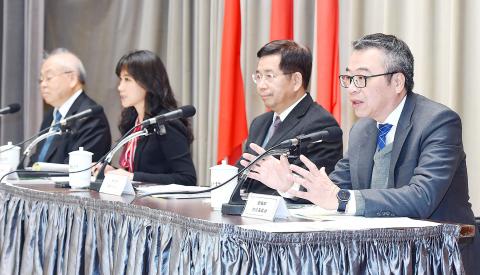Premier Su Tseng-chang (蘇貞昌) yesterday approved proposed items in a NT$60 billion (US$2 billion) budget created under the Special Act on COVID-19 Prevention, Relief and Restoration (嚴重特殊傳染性肺炎防治及紓困振興特別條例) passed on Tuesday, including compensation totaling NT$1.82 billion for people placed in quarantine and those who need to take leave to care for quarantined family members.
The special budget would be sourced in equal portions from surplus revenue from previous fiscal years and loans, the Directorate-General of Budget, Accounting and Statistics (DGBAS) told a news conference in Taipei.
Disease prevention, which accounts for NT$19.6 billion of the budget, would cover the costs of hospitals isolating people being screened for COVID-19; compensation to hospitals that are forced to suspend operations due to confirmed cases or as a result of receiving patients who test positive for the disease; the procurement or expropriation of resources necessary for disease prevention; general disease-prevention work; and the compensation for people quarantined or taking care of quarantined family members.

Photo: Liao Chen-huei, Taipei Times
Deputy Minister of Health and Welfare Ho Chi-kung (何啟功) said that the NT$1.82 billion sum was determined by multiplying daily compensation of NT$1,000 per person by the estimated 130,000 recipients over the course of 14 days during which compensation would be paid.
However, people who are paid by their employers while under quarantine or on leave would not be eligible for the compensation, he added.
The actual amount of daily compensation per person would be determined on March 10, as the act stipulates that agencies must introduce accompanying regulations within two weeks of its passage, but it would not fall below the minimum daily wage of NT$800, Ho said.
As the compensation aims to make up for the personal freedom sacrificed for disease prevention, minors who are quarantined at home, as well as their parents on leave to take care of them, would also be eligible to receive compensation, he added.
Should the number of people eligible for the compensation exceed 130,000, additional redress would be paid out from the Ministry of Health and Welfare’s budget for grants and subsidies, which totals NT$9.2 billion for the current fiscal year, DGBAS Minister Chu Tzer-ming (朱澤民) said, reassuring the public that all eligible applicants would receive compensation.
The items earmarked to bail out sectors affected by the coronavirus make up the remaining NT$40.4 billion of the budget, including recovery plans for tourism (NT$5.4 billion); compensation to hoteliers (NT$1.5 billion); subsidies to airlines and airports (NT$4.29 billion); coupons to be issued by the Ministry of Economic Affairs to spur domestic spending (NT$2 billion); and subsidies to the cultural and creative sectors (NT$800 million), the DGBAS said.
The Ministry of Culture has proposed setting aside NT$300 million from its budgeted NT$800 million to subsidize performance and exhibition venues whose business has suffered due to the virus, Chu said, adding that it would determine before March 10 how much would be set aside for coupons, which would also be redeemable at performance and exhibition venues.
The proposed budget is to be sent to the Legislative Yuan for review.

Taiwan has received more than US$70 million in royalties as of the end of last year from developing the F-16V jet as countries worldwide purchase or upgrade to this popular model, government and military officials said on Saturday. Taiwan funded the development of the F-16V jet and ended up the sole investor as other countries withdrew from the program. Now the F-16V is increasingly popular and countries must pay Taiwan a percentage in royalties when they purchase new F-16V aircraft or upgrade older F-16 models. The next five years are expected to be the peak for these royalties, with Taiwan potentially earning

POSITIVE DEVELOPMENT: Japan and the US are expected to hold in-depth discussions on Taiwan-related issues during the meeting next month, Japanese sources said The holding of a Japan-US leaders’ meeting ahead of US President Donald Trump’s visit to China is positive news for Taiwan, former Japan-Taiwan Exchange Association representative Hiroyasu Izumi said yesterday. After the Liberal Democratic Party’s landslide victory in Japan’s House of Representatives election, Japanese Prime Minister Sanae Takaichi is scheduled to visit the US next month, where she is to meet with Trump ahead of the US president’s planned visit to China from March 31 to April 2 for a meeting with Chinese President Xi Jinping (習近平). Japan and the US are expected to hold in-depth discussions on Taiwan-related issues during the

‘LIKE-MINDED PARTNER’: Tako van Popta said it would be inappropriate to delay signing the deal with Taiwan because of China, adding he would promote the issue Canadian senators have stressed Taiwan’s importance for international trade and expressed enthusiasm for ensuring the Taiwan-Canada trade cooperation framework agreement is implemented this year. Representative to Canada Harry Tseng (曾厚仁) in an interview with the Central News Agency (CNA) said he was increasingly uneasy about Ottawa’s delays in signing the agreement, especially as Ottawa has warmed toward Beijing. There are “no negotiations left. Not only [is it] initialed, we have three versions of the text ready: English, French and Mandarin,” Tseng said. “That tells you how close we are to the final signature.” Tseng said that he hoped Canadian Prime Minister Mark Carney

STAY IN YOUR LANE: As the US and Israel attack Iran, the ministry has warned China not to overstep by including Taiwanese citizens in its evacuation orders The Ministry of Foreign Affairs (MOFA) yesterday rebuked a statement by China’s embassy in Israel that it would evacuate Taiwanese holders of Chinese travel documents from Israel amid the latter’s escalating conflict with Iran. Tensions have risen across the Middle East in the wake of US and Israeli airstrikes on Iran beginning Saturday. China subsequently issued an evacuation notice for its citizens. In a news release, the Chinese embassy in Israel said holders of “Taiwan compatriot permits (台胞證)” issued to Taiwanese nationals by Chinese authorities for travel to China — could register for evacuation to Egypt. In Taipei, the ministry yesterday said Taiwan